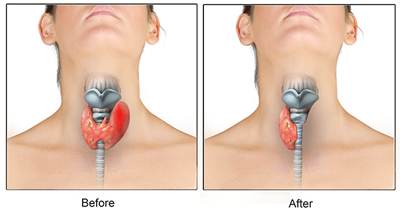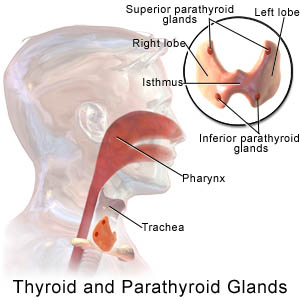THYROID SURGERY
Thyroid cancer is an abnormal growth of the cells of the thyroid gland, a butterfly-shaped gland located in the front of your neck just below the voice box (larynx). The thyroid gland secretes hormones that help regulate the body’s metabolism and levels of calcium. Thyroid cancer is more common in women than men. People who are exposed to high levels of radiation to the neck and have a family history of thyroid cancer and goiter (enlargement of thyroid gland) are at a higher risk of developing thyroid cancer.
Generally, surgery involving thyroid gland removal is the most common treatment for thyroid cancer. Total thyroidectomy is a surgical procedure to remove all of the thyroid gland. Subtotal or partial thyroidectomy is a surgery to remove part of the thyroid gland. Your doctor may also remove the lymph nodes if the cancer has spread to the lymph nodes. The surgery is performed under general anesthesia. The surgeon removes the thyroid gland by making a 3-inch to 4-inch incision in the middle of your neck, on top of the thyroid gland. A small tube (catheter) may be placed temporarily into the area to drain the accumulated blood and fluids.
Risks of thyroid surgery
As with every major surgery, thyroid surgery carries the risk of an adverse reaction to general anesthetic. Other risks include heavy bleeding and infection.
Risks specific to thyroid surgery rarely occur. However, the two most common risks are:
- Damage to the recurrent laryngeal nerves (nerves connected to your vocal cords).
- Damage to the parathyroid glands (glands that control the level of calcium in your body).
Supplements can easily treat low levels of calcium. Treatment should start as soon as possible. Notify your doctor if you feel nervous or jittery or if your muscles start twitching. These are signs of low calcium.
What You Should Know
- A total thyroidectomy is surgery to take out all of your thyroid gland. Your thyroid gland is important for making hormones that help your body work right.
- If you have cancer, your thyroid gland, as well as tissue and lymph nodes around the gland may be removed.
- Thyroid hormone: You are given this medicine to bring your thyroid hormone level back to normal.
- Pain medicine: You may need medicine to take away or decrease pain.
- Learn how to take your medicine. Ask what medicine and how much you should take. Be sure you know how when and how often to take it.
- Do not wait until the pain is severe before you take your medicine. Tell caregivers if your pain does not decrease.
- Pain medicine can make you dizzy or sleepy. Prevent falls by calling someone when you get out of bed or if you need help.
- Calcium and vitamin D pills: Your caregiver may tell you to take calcium and vitamin D pills.



